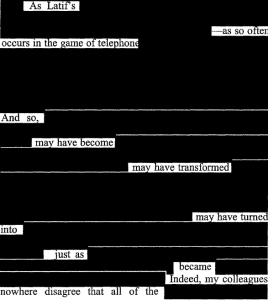Bill Keller Blames Leak Arrests that Preceded WikiLeaks on WikiLeaks
Bill Keller has another narcissistic column attacking Julian Assange. The whole thing is rubbish not worth your time, but I did want to unpack the complaint with which Keller ends his column.
“A lot of attention has been focused on WikiLeaks and its colorful proprietors,” Aftergood told me. “But the real action, it turns out, is not at the publisher level; it’s at the source level. And there aren’t a lot of sources as prolific or as reckless as Bradley Manning allegedly was.”
For good reason. The Obama administration has been much more aggressive than its predecessors in pursuing and punishing leakers. The latest case, the arrest last month of John Kiriakou, a former C.I.A. terrorist-hunter accused of telling journalists the names of colleagues who participated in the waterboarding of Qaeda suspects, is symptomatic of the crackdown. It is this administration’s sixth criminal case against an official for confiding to the media, more than all previous presidents combined. The message is chilling for those entrusted with keeping legitimate secrets and for whistleblowers or officials who want the public to understand how our national security is or is not protected.
Here’s the paradox the documentaries have overlooked so far: The most palpable legacy of the WikiLeaks campaign for transparency is that the U.S. government is more secretive than ever. [my emphasis]
The Obama Administration has charged 6 people with some kind of espionage charge for leaking:
- Thomas Drake was indicted on April 10, 2010, just days after the release of the Collateral Murder video and before Bradley Manning first contacted Adrian Lamo; he was charged for purported leaks going back to February 2006
- Shamai Leibowitz was first investigated in mid-2009, before Manning leaked anything to WikiLeaks; he was charged on December 4, 2009 and sentenced on May 24, 2010, the day the government was first learning about Lamo’s conversations with Manning
- Stephen Jin-Woo Kim was indicted on August 19, 2010, around the time DOD first started trying to figure out what Manning allegedly sent to WikiLeaks; he is alleged to have leaked in June 2009
- Manning was arrested on May 29, 2010 and will be formally charged this week for leaks allegedly starting in November 2009
- Jeffrey Sterling was indicted on December 22, 2010, around the time the government was trying to pressure Manning into testifying about Assange; his leaks allegedly started in 2001
- John Kiriakou was charged on January 23, 2012 for leaks dating back to 2007
All the non-WikiLeaks leaks allegedly took place before Manning’s. All were formally charged before Manning, and all but two men were arrested before Manning.
And yet Bill Keller, in a demonstration of his typical reporting skill though not Newtonian physics, suggests that WikiLeaks caused the crackdown on leaks.


